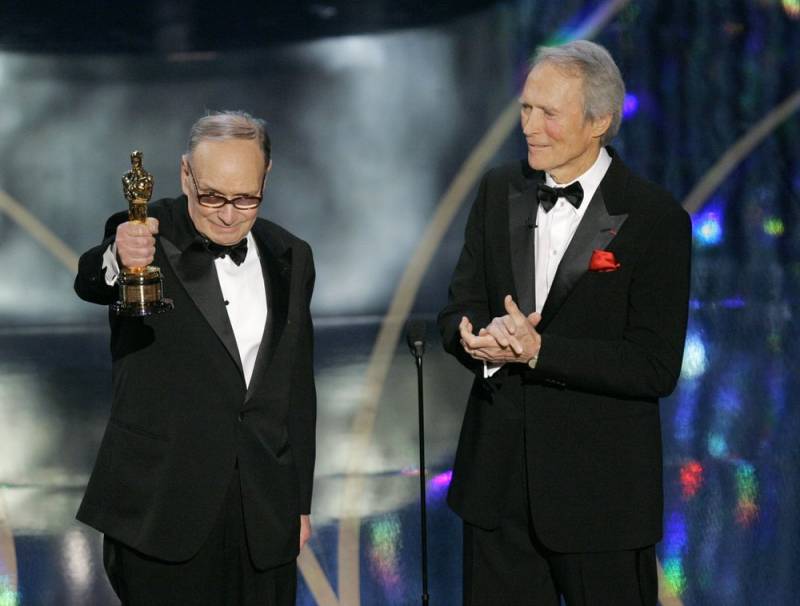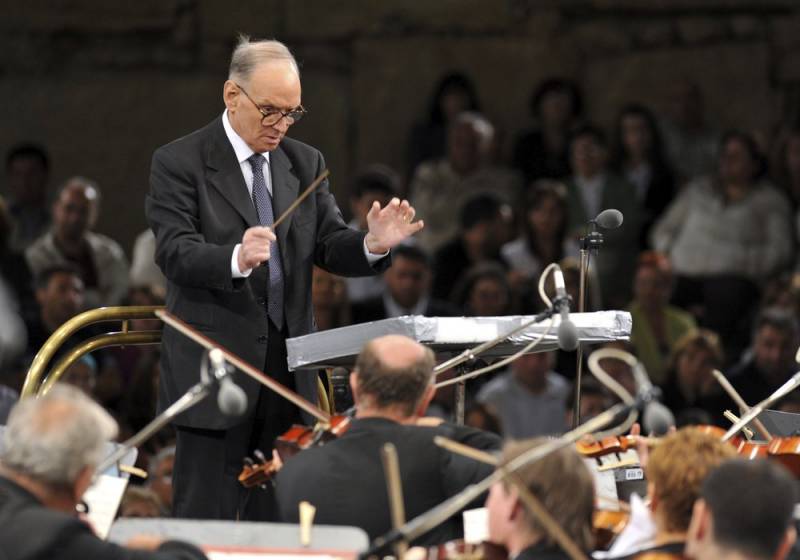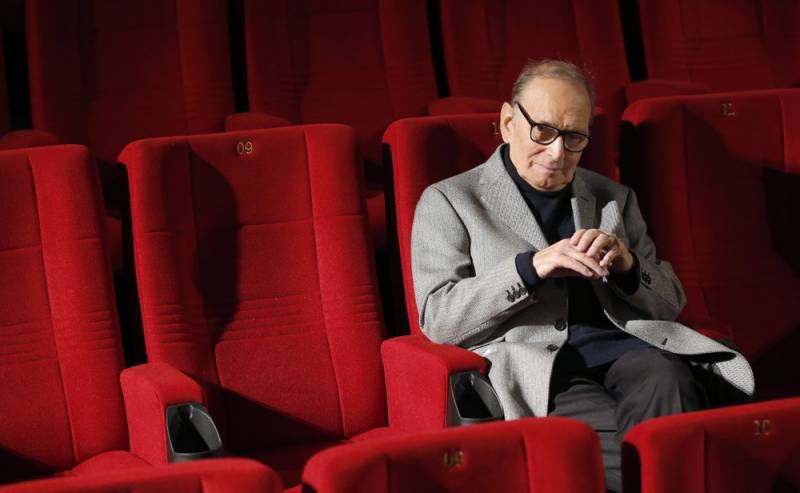Ennio Morricone, the Oscar-winning Italian composer who created the coyote-howl theme for the iconic Spaghetti Western The Good, the Bad and the Ugly and often haunting soundtracks for such classic Hollywood gangster movies as The Untouchables and the epic Once Upon A Time In America, died Monday. He was 91.
Morricone’s longtime lawyer, Giorgio Assumma, said “the Maestro,” as he was known, died in a Rome hospital of complications following surgery after a recent fall in which he broke a leg bone.
Outside the hospital, Assumma read a farewell message from Morricone.
“I am Ennio Morricone, and I am dead,” began the message. In the greeting, the composer went on to explain that the only reason he was saying goodbye this way and had requested a private funeral was: “I don’t want to bother anyone.”
During a career that spanned decades and earned him an Oscar for lifetime achievement in 2007, Morricone collaborated with some of Hollywood’s and Italy’s top directors, including on The Untouchables by Brian de Palma, The Hateful Eight by Quentin Tarantino , The Battle of Algiers by Gillo Pontecorvo and Nuovo Cinema Paradiso, a nostalgic ode to the importance of movie houses in Italian small town life, by Giuseppe Tornatore.
The Tarantino film would win him the Oscar for best original score in 2016. In accepting that award, Morricone told the audience at the ceremony: “There is no great music without a great film that inspires it.”
In total, he produced more than 400 original scores for feature films.

His iconic so-called Spaghetti Western movies saw him work closely with the late Italian film director Sergio Leone, a former classmate.
Morricone practically reinvented music for Western genre movies through his partnership with Leone. Their partnership included the Dollars trilogy starring Clint Eastwood as a quick-shooting, lonesome gunman: A Fistful of Dollars in 1964, For a Few Dollars More in 1965 and The Good, the Bad and the Ugly a year later.
Morricone was celebrated for crafting just a few notes — like those played on a harmonica in Leone’s 1984 movie Once Upon A Time in America — that would instantly become a film’s highly memorable motif.
That movie is a saga about Jewish gangsters in New York that explores themes of friendship, lost love and the passing of time, starring Robert De Niro and James Wood. It is considered by some to be Leone’s masterpiece, thanks in part to Morricone’s evocative score, including a lush section played on string instruments.
“Inspiration does not exist,” Morricone said in a 2004 interview with The Associated Press. “What exists is an idea, a minimal idea that the composer develops at the desk, and that small idea becomes something important.”
In a later interview, with Italian state TV, Morricone cited “study, discipline and curiosity” as the keys to his creative genius. “Writing music, like all creative arts, comes from a long path” along life’s experiences, he said.
“A great phenomenon of world music” was how Italian film director Dario Argento described Morricone, who scored five of his films.

In his late 80s, Morricone provided the score for The Hateful Eight, Tarantino’s 2015 70-mm epic and the first time in decades that he had composed new music for a Western. It was also the first time Tarantino had used an original score.
In accepting Morricone’s Golden Globe for the music in his place, Tarantino called him his favorite composer.
“When I say ‘favorite composer,’ I don’t mean movie composer. … I’m talking about Mozart, I’m talking about Beethoven, I’m talking about Schubert,” Tarantino said.
Italy’s head of state, President Sergio Mattarella, in a condolence message to the composer’s family, wrote: “Both a refined and popular musician, he left a deep footprint on the musical history of the second half of the 1900s.”
Morricone’s sound tracks, Mattarella said, “contributed greatly to spreading and reinforcing the prestige of Italy in the world.”
Morricone’s style was sparse, made of memorable tunes and unusual instruments and arrangements, and often stirred deep emotions.
His music punctuated the long silences typical of the Spaghetti Westerns, with the characters locked in close-ups, staring at each other and waiting for their next moves. The coyote howl, harmonicas and eerie whistling of The Good, the Bad and the Ugly became Morricone’s trademark and one of the most easily recognizable soundtracks in cinema.
Minutes before handing Morricone the Oscar for lifetime achievement in 2007, Eastwood recalled hearing for the first time the score of A Fistful of Dollars and thinking: “What actor wouldn’t want to ride into town with that kind of music playing behind him?”
It was a night to remember for Morricone, who had been nominated for Oscars five times (The Hateful Eight was his sixth) but until then had never won.


